What are your favourite passages in the Bible?
Yes, John 3:16. Perhaps Isaiah 40:31? Or John 14:16? Or maybe the whole of 1 Corinthians 13?
But there are probably a few Psalms in there too. Psalm 23 perhaps. Or Psalm 8, or Psalm 1, or…
Yes, John 3:16. Perhaps Isaiah 40:31? Or John 14:16? Or maybe the whole of 1 Corinthians 13?
But there are probably a few Psalms in there too. Psalm 23 perhaps. Or Psalm 8, or Psalm 1, or…
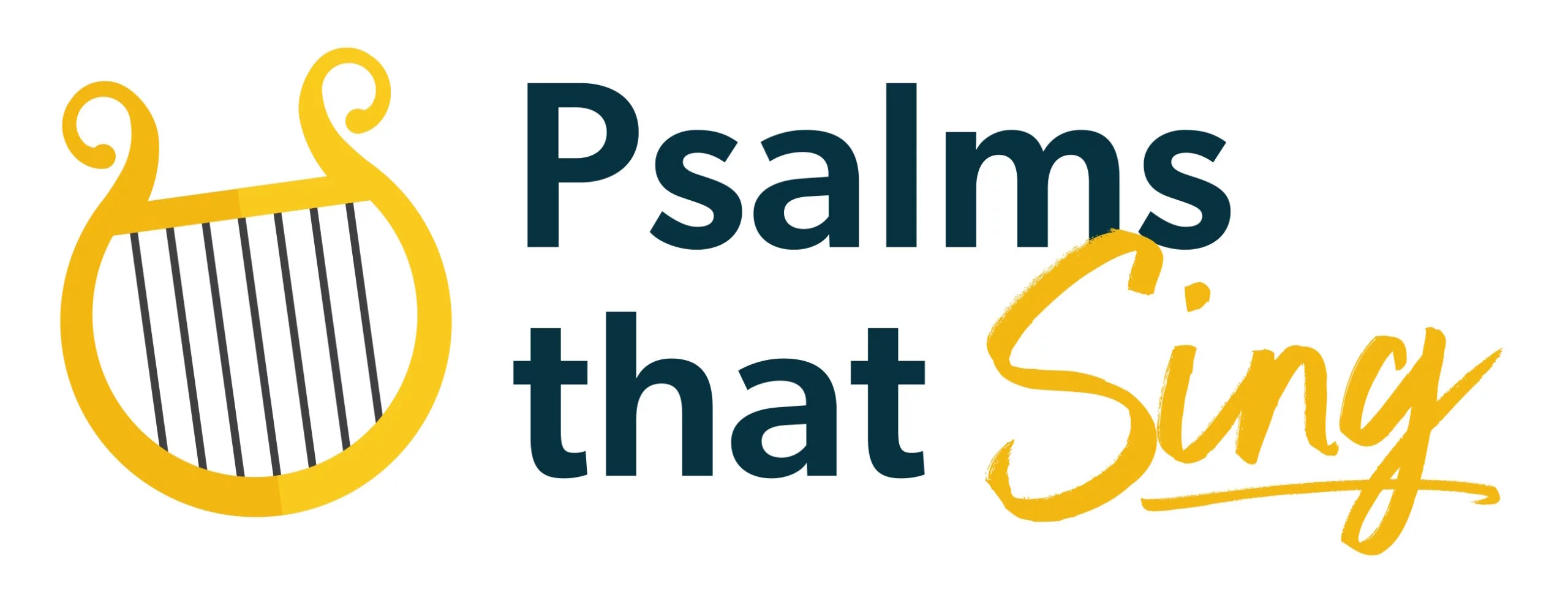 The ‘Psalms that Sing’ logo
The ‘Psalms that Sing’ logo We love the Psalms, because they are so full of passion and praise, deep feelings, moods, laments, and conversations with God…
Words that capture the human experience so beautifully. And just as the Israelites did, so we too set them to music so we can sing them to each other and to God.
We can read, speak and sing the Psalms because they have been translated into our language.
But what if they haven’t been translated yet? And what if you are an oral culture that needs a different way of translating biblical poetry? What do you do then?
A group of Bible translators has come up with a solution.
Most people groups have rich traditions of poetry and oral art. ‘Psalms that Sing’ is an initiative that provides an environment where poets, songwriters and oral artists can translate the Psalms in a way that connects with their communities and culture.
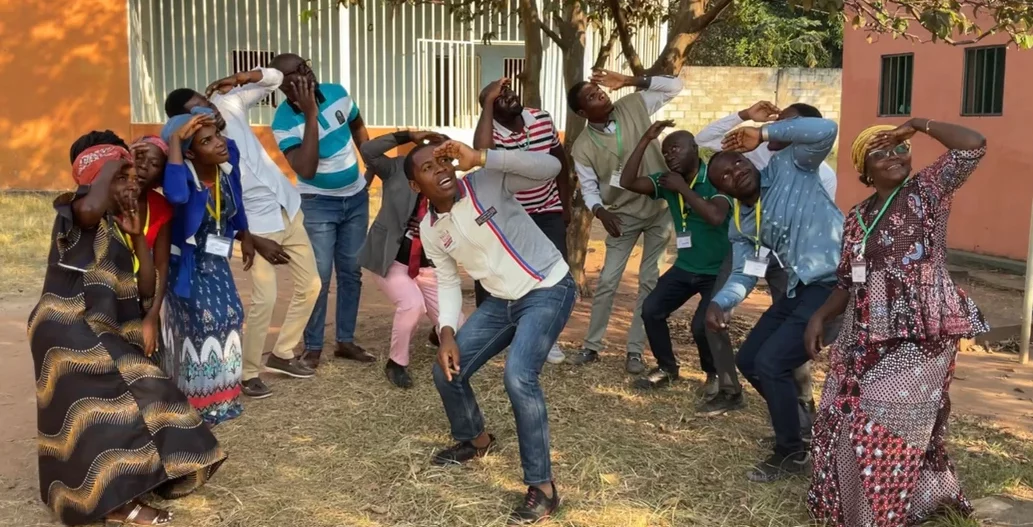 The Cokwe ‘Psalms that Sing’ team act out Psalm 8
The Cokwe ‘Psalms that Sing’ team act out Psalm 8 Currently, the initiative is being piloted in six languages across different contexts in Africa. These contexts include urban and rural, English and Portuguese, Muslim and Christian, and large and small language groups. The hope is that the initiative will be rolled out across the world.
Benjie and Rhoda Leach serve with Wycliffe and work with the Cokwe people in Angola and the Wantu* people in Malawi. Benjie says:
‘“Psalms that Sing” guides poets and musicians in a creative process. They translate the Psalms so they may be learned, heard and sung, in rejoicing and in sorrow, in strength and in weakness, in confidence and in fear. We want them to be “Psalms that Sing” because they are Psalms from the heart. And we want them to be Psalms to pray because they help us to speak of, with, and to the Lord Jesus.’
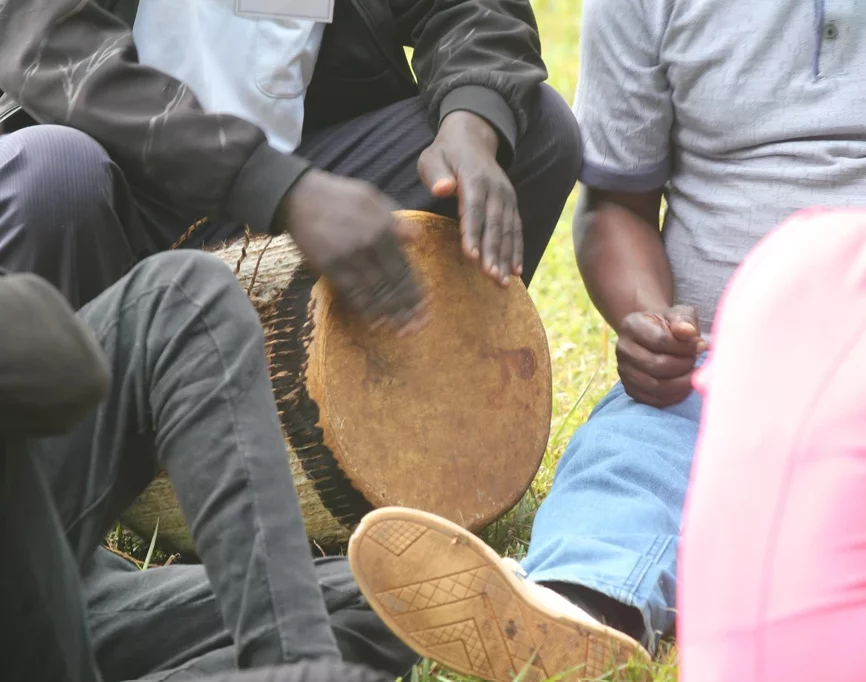 Wantu drumming at a ‘Psalms that Sing’ workshop
Wantu drumming at a ‘Psalms that Sing’ workshop The translators work as a group and move through a 10-step process. This moves from listening to Psalms in another language to praying and singing them in their own. Benjie continues: ‘The process is almost entirely oral. Pen and paper are set aside for listening, engaging, singing and speaking. Initially the group comes up with a rhythmic and poetic oral version of the psalm – a translation which “lives”. Then comes checking for accuracy and looking at how to improve the poetry. By the end, they have a pdf of the finished text, an audio reading, and at least one song based on part or all of the Psalm.’
The expectation is that these Psalms are then taken back into the community and used. In this way they become a part of daily life, not just in the churches but out in the community too.
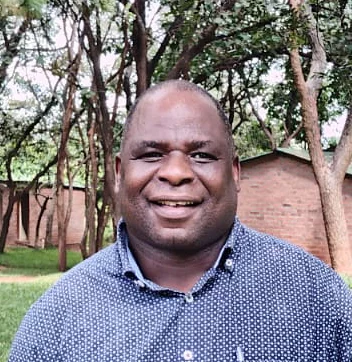 ‘It is putting the word of God in their hearts’ – Joel
‘It is putting the word of God in their hearts’ – Joel Joel, a Wantu man working on the Wantu project, says:
‘This is a culture that likes singing. We are taking traditional music and putting words to it from the Psalms. So when people listen to the songs, they will like them. It will be like their own songs.
‘They will be singing them everywhere. When they go to the mountain to fetch firewood, when they fetch water, go to the mill… they will be singing them. They will be singing the word of God. It is putting the word of God in their hearts.’
The pilot languages are at different stages. The most advanced is the Kaaps language group in South Africa, which is showing just how big an impact ‘Psalms that Sing’ can have.
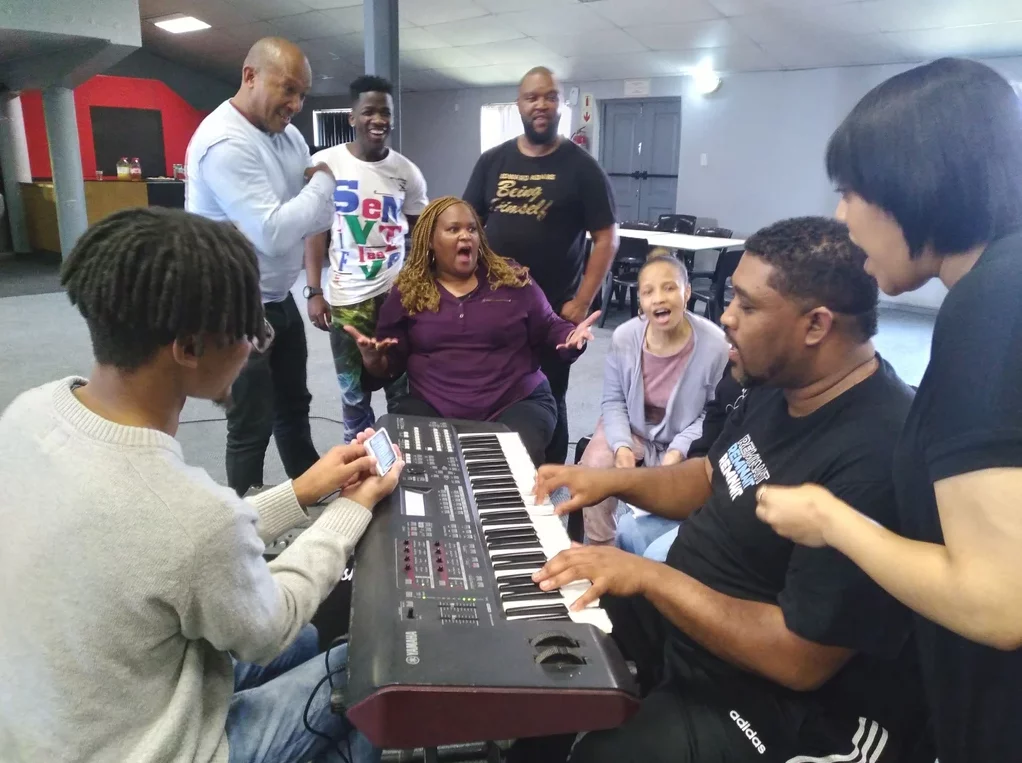 The Kaaps team at one of the ‘Psalms that Sing’ workshops
The Kaaps team at one of the ‘Psalms that Sing’ workshops Helen van der Walt, who serves with Wycliffe and works alongside the Kaaps team, says:
‘Through “Psalms that Sing”, a team of artist-translators was put together to explore, translate and perform the Psalms in Kaaps. Their first workshop was held in October 2022.
‘Initially, those invited to take part were sceptical, but they left beaming, excited by what they were a part of.
‘The Kaaps team has had an amazing reception, and continues to work at a very high standard. Eighteen months into the project and they have completed 39 Psalms. Out of that has resulted a group called “Alive in Kaaps”. They created a production of their Psalms that they have now presented three times, including to 500 people in an auditorium.
 ‘This is our music!’ People respond to the ‘Alive in Kaaps’ production in South Africa
‘This is our music!’ People respond to the ‘Alive in Kaaps’ production in South Africa ‘They even released a single of their Psalm 124 performance, “Assitie Virrie Yirre Wassie”. And this was the number one song for 2023 on a popular Cape Town radio station.’ That radio station now has a session every Tuesday called ‘Assitie Virrie Yirre Wassie’ (‘What if the Lord wasn’t for us?’), where people call in with testimonies.
The reception to these performances is very encouraging. But even more important is the impact that ‘Psalms that Sing’ is having in the community.
Helen continues: ‘What is vital is that through this work God is liberating the Kaaps identity and validating it as wonderful and worthy of God’s word. We constantly hear people saying phrases like “That’s how we speak!” or “This is our music!” Kaaps speakers are becoming free to talk to God as they talk to their neighbours. And to express themselves in worship authentically with their whole soul. We pray with anticipation as the ripple effects travel further out. And more people are freed to proudly call themselves Kaaps Christians.’
Lizette, one of the ‘Alive in Kaaps’ team, sums it up:
 The ‘Alive in Kaaps’ live production
The ‘Alive in Kaaps’ live production ‘It’s both an honour and a privilege to bring the word of God to our people in song, dance, spoken word, drama, and in our heart language. It’s humbling and awe-inspiring knowing that we bring messages of hope, healing, restoration, and validation to our people.’
*name changed for security reasons